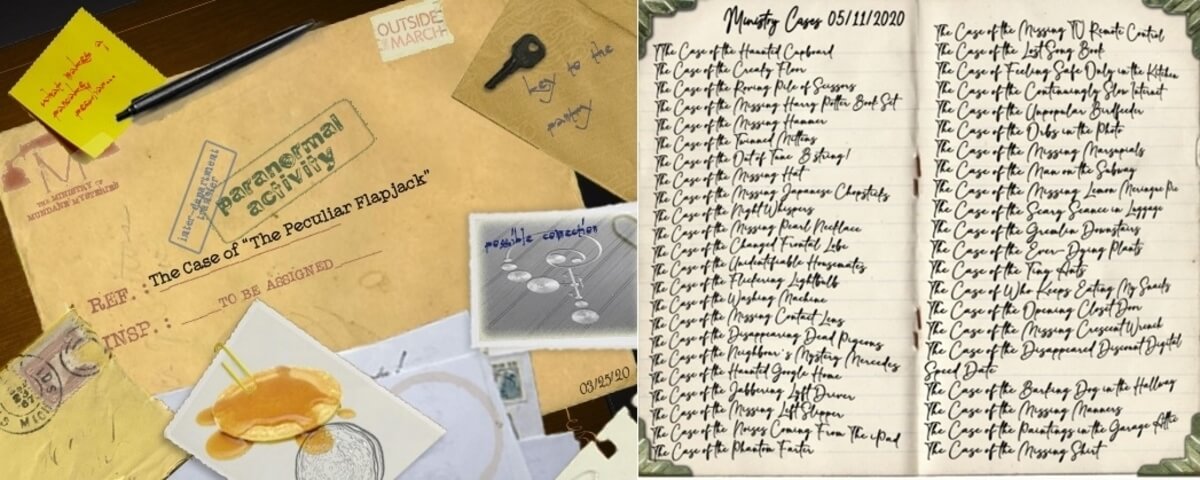
Outside the March Theatre/The Ministry of Mundane Mysteries, created by the OtM Team, directed by Mitchell Cushman and Griffin McInnes, via telephone, indefinite run. Bookings available at mundanemysteries.com.
In a recent conversation I had with Outside the March (OtM) artistic director Mitchell Cushman, I pointed out that he and his team were theatrical structural engineers, to which he replied, “That’s our specialty!”
And I wasn’t kidding, because I’m continually amazed by the intricate and labyrinthine organization that goes into an OtM show, designed to produce the ultimate immersive theatrical experience. Although OtM’s latest venture, The Ministry of Mundane Mysteries, is performed over the telephone, the structure needed to pull off this remote tele-theatre is just as complex as any of their award-winning staged productions, not to mention that it is also a lot of fun.
The premise is this: when you book your ticket, (with all proceeds going to the actors), you provide a title for the mystery you want solved, like The Case of the Missing Sock, or The Case of the Phantom Faucet. In other words, the kick-off point is a mundane mystery from your own life.
You then choose a time slot (mine was 5:30 p.m.) and for six days, Monday to Saturday, you get a phone call at that time that lasts roughly ten minutes, with each successive conversation getting you closer to your mystery being solved — which, of course, is neatly wrapped up by Saturday. In other words, your individualized play lasts an hour in total.
To give you some idea of what’s involved in the convoluted planning, there are 12 time slots a day, with four actors making calls during each slot, for a total of 48 calls a day. Mundane Mysteries can accommodate 48 households a week, using a roster of 12 actors. For example, I spoke to four different people over my six days.
Now, Cushman admits that there is an overall story structure, but, nonetheless, the actors have to improvise to customize the content of the calls to fit each unique mystery, making sure to pass necessary information on to the next actor. As Cushman says, “The whole thing is like a remote, theatrical, improvised narrative relay race!”

On to my own experience with Mundane Mysteries. My case was The Scary Séance in Luggage Bay E. This is a true story. Many, many years ago, in my misbegotten youth, I was on a ship crossing the Tasman Sea between New Zealand and Australia, and I got involved in a séance. We snuck into Luggage Bay E, a storage hold for items that didn’t fit into the cabins, located in the bowels of the ship. The medium did summon a spirit, and I felt the frigid cold air at its arrival, and every hair on my body stood on end. It was terrifying. My charge to the Ministry of Mundane Mysteries was to discover who the spirit was.
My first call was from Inspector Cavanagh who asked me detailed questions about the incident, as well as a lot of seemingly unrelated details, such as music I liked, and assured me that his success rate at solving mysteries was 100%. I told him I was fond of the operas of Meyerbeer.
My next two calls were from an Australian called Jermain, and Brent Reese, a junior advisor to the New Zealand consulate. Jermain had been involved in a séance in an airplane over the Tasman Sea, and felt there was something bigger going on than just summoning spirits. For his part, the New Zealand representative accused me of adding to the rivalry between the countries, and that I was seriously compromising tourism by evoking spirits, which might frighten away people coming to see the places where Lord of the Rings was filmed.
The fourth call was from Inspector Cavanagh again, and he was calling from the Lord of the Rings set in New Zealand where he was investigating my case. He asked me if I could name a favourite gift dating back before the Tasman Sea incident. I mentioned a Barbara Ann Scott doll, and then the Inspector was suddenly cut off.
The fifth call was from Karen Berkowitz, a public relations representative from Mattel, the toy company, which had the rights to the Barbara Ann Scott doll. Apparently, the marabou used to trim the doll’s costume had side effects like causing sensations of extreme cold. In other words, no real paranormal experience happened to me. It was “the Scott effect”.
The last call was Inspector Cavanagh again. He was still in New Zealand. Apparently, the abrupt ending to our preceding phone conversation had occurred because he had suddenly spotted actor Ian McKellen. The Inspector dismissed everyone else’s theories, and told me my paranormal experience occurred because my birthday was December 31, which makes me particularly sensitive to spirits and spectres because of the change of the year.
He also disclosed a convoluted subplot involving Jermain and Karen, who were cousins, and a spell put on me, that I won’t go into. Suffice it to say my acute sensitivity to the paranormal will always be there, so the case was solved in terms of why I sensed the spirit. The Inspector ended with a piece of music to cheer me up, which was Meyerbeer’s Clarinet Quintet, accompanied by the adage that, “no mystery is too mundane”.
I was a little disappointed that the Inspector never solved the mystery of who the spirit was, but that’s all right, because a lot of other things happened. Also, I was not a passive listener, but I actually engaged with the actors, asking questions, for example, so they really had to use their improv skills with me. In fact, my advice to anyone signing up for Mundane Mysteries, and I strongly recommend that you do, is to participate full on, and really take advantage of the situation by enjoying the twists and turns of the journey. When your series is over, you get a rather lavish case report by email, so you can see what your Inspector looks like, at least.
I should end by saying that Alexis Soloski in her New York Times article, a compilation of various remote theatre experiences, said that she enjoyed The Ministry of Mundane Mysteries the most because it was made-to-measure and optimistic. “It let me be who I am,” she wrote, and I heartily agree. For six days I was on an adventure, and those 5:30 p.m. phone calls were a highlight in my day.
#LUDWIGVAN
Want more updates on classical music and opera news and reviews? Follow us on Facebook, Instagram or Twitter for all the latest.
- INTERVIEW | Actor Diego Matamoros Takes On Icon Walt Disney In Soulpepper Production Of Hnath Play - April 16, 2024
- SCRUTINY | Opera In Concert Shine A Light On Verdi’s Seldom Heard La Battaglia Di Legnano - April 9, 2024
- SCRUTINY | Lepage & Côté’s Hamlet Dazzles With Dance And Stagecraft Without Saying Anything New - April 5, 2024



